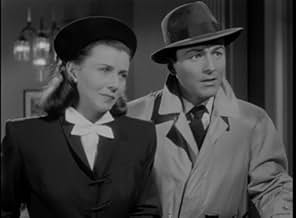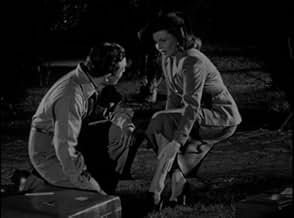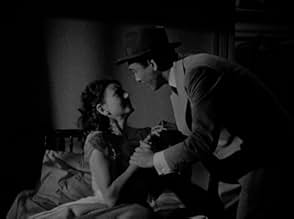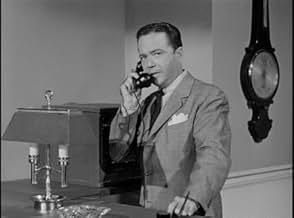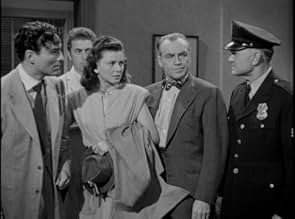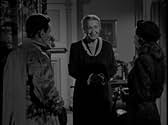Agrega una trama en tu idiomaOn his wedding eve, a groom's fiancée vanishes. Hiring a detective, he's drawn into a sinister conspiracy surrounding her ex-husband's death and his shady in-laws.On his wedding eve, a groom's fiancée vanishes. Hiring a detective, he's drawn into a sinister conspiracy surrounding her ex-husband's death and his shady in-laws.On his wedding eve, a groom's fiancée vanishes. Hiring a detective, he's drawn into a sinister conspiracy surrounding her ex-husband's death and his shady in-laws.
- Dirección
- Guionistas
- Elenco
Abigail Adams
- Traynor's Secretary
- (sin créditos)
Gertrude Astor
- Hotel Guest
- (sin créditos)
Trevor Bardette
- Arnold
- (sin créditos)
Steve Benton
- Male Nurse
- (sin créditos)
Dolores Castle
- Nurse
- (sin créditos)
Edgar Dearing
- Police Captain Griggs
- (sin créditos)
Ann Doran
- Sybil Barkley
- (sin créditos)
Otto Forrest
- The Whistler
- (voz)
- (sin créditos)
Wilton Graff
- Dr. Bertram H. Grantland
- (sin créditos)
Olin Howland
- Jeff Anderson
- (sin créditos)
Robert Emmett Keane
- Hart
- (sin créditos)
Kenner G. Kemp
- 2nd Male Nurse
- (sin créditos)
- Dirección
- Guionistas
- Todo el elenco y el equipo
- Producción, taquilla y más en IMDbPro
Opiniones destacadas
Last of the Whistler movies and the only one without star Richard Dix. The plot here is about a man (Michael Duane) whose fiancée (Lenore Aubert) disappears from her hotel the night before they are to be married. He investigates along with the assistance of a private detective. Michael Duane is okay but it's easy to see why the series didn't continue with him. Lenore Aubert is lovely. Richard Lane, usually playing Inspector Farraday in the Boston Blackie series, plays the private eye here. Great character actor Olin Howland stands out as a hotel clerk. Not a bad B movie but missing the screen presence of someone like Richard Dix. Still worth checking out if you catch it on TV one of these days.
The "Whistler" series of mysteries in the 1940s was one of the immediate ancestors of "film noir." The stories were usually dark, the characters were morally ambiguous, and the shadowy, anonymous narrator ("I am the Whistler") added an extra touch of creepiness.
This last entry in the series is different from the others. It's lighter, in both senses of the word. Though it's an adequate "B" mystery, it's no grimmer than an Agatha Christie film.
The difference is partly due to the writing and directing, but the absence of Richard Dix, the aging former star who played the leads in the previous films, is a big factor. Dix had a "noir" persona if ever there was one. He looked like a man haunted by the past and worried about the future. Here he's replaced by fresh-faced young Michael Duane, who just doesn't have the same gravitas.
The plot is a variation on a familiar theme. A man's new fiancée vanishes, and he quickly realizes how little he really knows about her. The more he learns what seems to be the truth, the more it makes sense simply to forget all about her, but he can't get past the feeling that somebody is lying to him.
The mystery woman is played by Lenore Aubert, who was sort of the poor man's Hedy Lamarr in the 1940s. She's supposed to be a French widow here, though she doesn't sound terribly French. (She was actually born in Slovenia and raised in Austria, and her Gallic-sounding screen name was dreamed up by Hollywood.)
This is a decent little crime story, but it's not representative of the "Whistler" movies. If you don't happen to like it, at least give another film in the series a look.
This last entry in the series is different from the others. It's lighter, in both senses of the word. Though it's an adequate "B" mystery, it's no grimmer than an Agatha Christie film.
The difference is partly due to the writing and directing, but the absence of Richard Dix, the aging former star who played the leads in the previous films, is a big factor. Dix had a "noir" persona if ever there was one. He looked like a man haunted by the past and worried about the future. Here he's replaced by fresh-faced young Michael Duane, who just doesn't have the same gravitas.
The plot is a variation on a familiar theme. A man's new fiancée vanishes, and he quickly realizes how little he really knows about her. The more he learns what seems to be the truth, the more it makes sense simply to forget all about her, but he can't get past the feeling that somebody is lying to him.
The mystery woman is played by Lenore Aubert, who was sort of the poor man's Hedy Lamarr in the 1940s. She's supposed to be a French widow here, though she doesn't sound terribly French. (She was actually born in Slovenia and raised in Austria, and her Gallic-sounding screen name was dreamed up by Hollywood.)
This is a decent little crime story, but it's not representative of the "Whistler" movies. If you don't happen to like it, at least give another film in the series a look.
This was the eighth and final Columbia Whistler film and the only one without Richard Dix who had retired from movies and was to die the following year. It's still a competent thriller, the machine carried on without him perfectly, but something was missing: Dix! The stories in the Whistler series were always interesting, sometimes brilliant, the screenplays often noir always atmospheric, but it wasn't only the Whistler himself that hung it all together on screen, Dix did too.
Young couple stepping out for a whole fortnight get the urge to marry in the pouring rain but are thwarted when the potential bride first disappears then is discovered to already be married before she apparently goes mad. Is the potential groom put off, even when the private dick he's hired to find her suddenly slugs him and lams, or is love blind? Who's twisting who is the question. Michael Duane in his penultimate film is OK if a bit of a wimp, lovely Lenore Aubert's finest moments came next film in Abbott & Costello Meet Frankenstein, and Richard Lane was wonderful as ever on loan from Boston Blackie. Also the only outing where the Whistler himself must have got wet from slouching about in the rain, unless he got sprayed with sea foam in Voice.
A lot happened in this last hour, well worth watching over and over again as usual to fans of the genre like me. The Whistler radio series begun in 1942 carried on until 1955 clocking up nearly 700 half hour shows, nearly all of which are available on mp3 and based upon what I've heard so far nearly all of which are well worth listening to as well.
Young couple stepping out for a whole fortnight get the urge to marry in the pouring rain but are thwarted when the potential bride first disappears then is discovered to already be married before she apparently goes mad. Is the potential groom put off, even when the private dick he's hired to find her suddenly slugs him and lams, or is love blind? Who's twisting who is the question. Michael Duane in his penultimate film is OK if a bit of a wimp, lovely Lenore Aubert's finest moments came next film in Abbott & Costello Meet Frankenstein, and Richard Lane was wonderful as ever on loan from Boston Blackie. Also the only outing where the Whistler himself must have got wet from slouching about in the rain, unless he got sprayed with sea foam in Voice.
A lot happened in this last hour, well worth watching over and over again as usual to fans of the genre like me. The Whistler radio series begun in 1942 carried on until 1955 clocking up nearly 700 half hour shows, nearly all of which are available on mp3 and based upon what I've heard so far nearly all of which are well worth listening to as well.
This being the final entry in the superlative Whistler series, I was expecting a dud. But it's not. Overall, the movie is definitely second rank but still representative of many of the series' better elements. The mystery sets up quickly as prospective bride (Aubert) disappears from her hotel room, leaving prospective groom (Duane) wondering what went wrong. After all, she seemed so sincere and loving. The hotel clerk (Howland, I believe) is worse than no help and may make you glad for Motel 6. The mystery deepens as detective Lane turns up clues and things begin to appear not as expected.
Duane is serviceable in the lead, replacing series regular Richard Dix. More importantly, I'm not sure how well the aging, dissipated Dix could have matched up with the innocent bridegroom role, anyway. What the entry lacks is the trademark provocative ending and the suffused atmosphere that characterize the William Castle directed entries, suggesting that Castle was more formative to the series' overall excellence than perhaps thought.
Still, it's puzzling to me that the series ended so abruptly, even without Dix. The material certainly reflected popular noirish programming of the period, so I would surmise that an audience was there. Perhaps there's an inside story. Nonetheless, in my little book, The Whistler series remains the most memorably unusual to emerge from the movie- drenched 1940's, even if this entry falls short.
Duane is serviceable in the lead, replacing series regular Richard Dix. More importantly, I'm not sure how well the aging, dissipated Dix could have matched up with the innocent bridegroom role, anyway. What the entry lacks is the trademark provocative ending and the suffused atmosphere that characterize the William Castle directed entries, suggesting that Castle was more formative to the series' overall excellence than perhaps thought.
Still, it's puzzling to me that the series ended so abruptly, even without Dix. The material certainly reflected popular noirish programming of the period, so I would surmise that an audience was there. Perhaps there's an inside story. Nonetheless, in my little book, The Whistler series remains the most memorably unusual to emerge from the movie- drenched 1940's, even if this entry falls short.
I hate reading reviews that say something like, 'Don't waste your time, this film stinks on ice.' It does to that reviewer yet for me, it may have some sort of naïve charm. If you like the other 'Whistler' series films, this one will be watchable. If you like 40s noirish films, this one will be watchable.
This film is not as good, in my opinion, as any of the earlier series entries which starred Richard Dix as the protagonist. It's much slower, and the plot is trite. You've seen this same narrative device used in many other films, and usually better.
But the acting is good, and so is the lighting, and the dialog. It's just lacking in energy and you'll likely figure out exactly what's going on and how it's all going to come out in the end not more than a quarter of the way through.
The 'Whistler' series is semi-noir, and there character, mood, lighting, camera movement and angles are more important than the story itself. But this film is not noir. It's too light weight and Hollywood innocent for that. Neither Richard Dix's character nor those of any of his ladies in the previous films had to come to a good end. You just never knew until the end.
But still, I'll recommend this one for at least a single viewing. I've watched it at least twice myself, and got a reasonable amount of enjoyment out of it both times.
This film is not as good, in my opinion, as any of the earlier series entries which starred Richard Dix as the protagonist. It's much slower, and the plot is trite. You've seen this same narrative device used in many other films, and usually better.
But the acting is good, and so is the lighting, and the dialog. It's just lacking in energy and you'll likely figure out exactly what's going on and how it's all going to come out in the end not more than a quarter of the way through.
The 'Whistler' series is semi-noir, and there character, mood, lighting, camera movement and angles are more important than the story itself. But this film is not noir. It's too light weight and Hollywood innocent for that. Neither Richard Dix's character nor those of any of his ladies in the previous films had to come to a good end. You just never knew until the end.
But still, I'll recommend this one for at least a single viewing. I've watched it at least twice myself, and got a reasonable amount of enjoyment out of it both times.
¿Sabías que…?
- TriviaEighth and last film of the Whistler series released by Columbia from 1944 to 1948.
- ErroresAt the end of the meeting with the hotel manager, hotel clerk, police Captain and Ted Nichols, the police Captain escorts Ted out of the office and incorrectly calls him Mr. Nicholas.
- Citas
Dr. Bertram H. Grantland: But don't worry about that, Darling--where are your clothes?
- ConexionesFollows Fantasmas en la noche (1944)
Selecciones populares
Inicia sesión para calificar y agrega a la lista de videos para obtener recomendaciones personalizadas
Detalles
- Fecha de lanzamiento
- País de origen
- Sitios oficiales
- Idiomas
- También se conoce como
- Die Rückkehr des Whistler
- Productoras
- Ver más créditos de la compañía en IMDbPro
- Tiempo de ejecución1 hora 2 minutos
- Color
- Relación de aspecto
- 1.37 : 1
Contribuir a esta página
Sugiere una edición o agrega el contenido que falta

Principales brechas de datos
By what name was The Return of the Whistler (1948) officially released in India in English?
Responda
